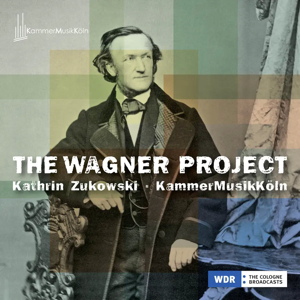
Richard Wagner (1813-1883)
The Wagner Project
Prelude to Tristan und Isolde (1874/75?, arr. with new finale by Engelbert Humperdinck)
Wesendonck-Lieder (1857/58, arr. for voice & ensemble by Simone Fontanelli)
Siegfried-Idyll (1870)
French Songs (1840, arr. for voice & ensemble by Simone Fontanelli):
Mignonne; Dors, mon enfant; Adieux de Marie Stuart
Kathrin Zukowski (soprano), KammerMusicKöln
rec. live, March 2023, Historische Gemeindesaal, Bonn, Germany
First recording (French songs)
German and French texts in booklet; translations provided online
CAvi-Music 8553530 [58]
This is a live recording of the KammerMusikKoln’s “10+1” Wagner Project anniversary concert, featuring fifteen instrumentalists and soprano soloist Kathrin Zukowski, a member of the regular ensemble of soloists at Cologne Opera. All the works played here are rarities, being arrangements for chamber music ensemble: Engelbert Humperdinck’s almost entirely unknown arrangement of the prelude to Tristan und Isolde and his own 24-bar finale, a world premiere recording of the French Songs, and the Wesendonck-Lieder both in newly-commissioned arrangements by Simone Fontanelli, and the composer’s own chamber music arrangement of the Siegfried Idyll.
The songs are three of six Wagner wrote while in Paris, hoping to make his reputation with them, but he could not find singers of any status prepared to perform them. Apart from the deservedly celebrated Wesendonck-Lieder, they are his only significant forays into art song and have hitherto been neglected – the Seven Compositions on Goethe’s Faust (1831) were student works which he suppressed and were published only posthumously.
The first item we hear is the overture to Wagner’s most radical and influential opera, Tristan und Isolde. As the solo instruments – violin, piano, then cello – enter, their leaner timbre perhaps falls strangely on the ear habituated to the full-fat orchestration of the original but the beauty of the music still seduces; my main reservation centres upon the suitability of the essentially bright, bell-like contribution of that piano which has a leading role and is present virtually constant throughout. I cannot help thinking that the textures of an ensemble consisting uniquely of strings would have been more apt, The pace does not seem rushed but at only 7:29 is much briefer than the normal ten or eleven minutes and somewhat of the requisite grandeur and mystery is lost. Humperdinck’s ending is in no sense jarring but rather too comfortable compared with the hushed suspense and sense of expectation of the original.
I love the Wesendonck-Lieder and have posted a survey of the major recordings, essentially favouring big voluptuous voices which can ride over the lush arrangements for full orchestra. Kathrin Zukowski brings to them a light, pleasant, unexceptional soprano in no way especially suited to the dark eroticism of those songs; her trilling simply sounds under-nourished compared with exponents such as Jessye Norman. Proof that I am not prejudiced against a chamber arrangement is evident in my praise of conductor John Nelson’s and contralto Stephanie Blythe’s use of Hans-Werner Henze’s re-working of the songs – but Blythe has a much larger, more substantial instrument than Zukowski. The climax to “Schmerzen” is especially underwhelming and “Träume” fares little better; it is like looking at a masterpiece through the wrong end of a telescope.
I find myself repeating my verdict as declared in a recent review of Kent Nagano’s recording of Mahler’s chamber orchestra arrangement of Schubert’s Death and the Maiden string quartet – only this time the principle is reversed, in that a smaller, leaner original is expanded, but my response is the same: what is truly gained by such arrangements and what is their point beyond affirming, as is the case for me, a preference for the Urtext?
The Siegfried Idyll is beautifully, soulfully played, the transparency of the chamber version hardly compromising its luxuriance; kudos to leader Natalie Chee who is presumably the solo violinist here. For me, it is the most satisfying of the four works in this programme, despite some brass and woodwind intonation issues in the concluding bars.
The three French songs are much better suited to Zukowski’s pure soprano; she sings with delicacy and grace in impeccable French. The third song, Mary Stuart’s apostrophe to her beloved France on being obliged to leave for Scotland, is the most substantial among them but could be by any early Romantic composer; nothing about them gives a clue that they are by Wagner and I cannot see them being regarded as more than a charming divertissement.
Ralph Moore
Buying this recording via a link below generates revenue for MWI, which helps the site remain free.




















